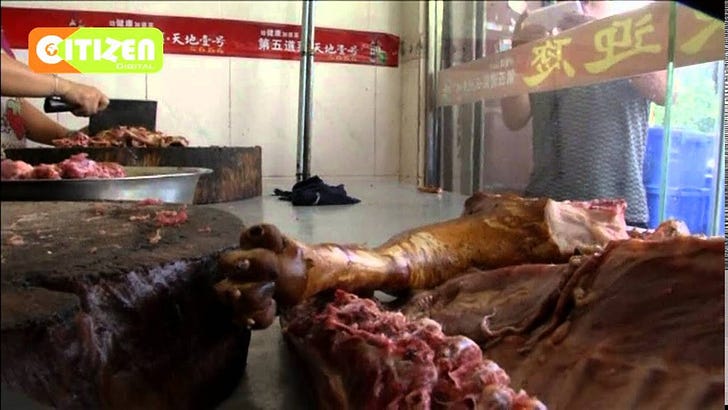Part III of IV in our discussion.
As another June slips away, the contentious Lychee Dog Meat Festival in Yulin, China, persists, despite increasing opposition from animal rights activists, global outcry, and promises of reform. The ongoing existence of the festival underscores the complexity of cultural practices, ethical considerations, and animal welfare issues that continue to provoke debate and activism.
Origins
The Lychee Dog Meat Festival, commonly referred to as the Yulin Dog Meat Festival, is an annual event held in Yulin, Guangxi, China. Contrary to the assertions of a long-standing tradition, the festival is a relatively recent phenomenon, estimated to have begun in 2009. It was initiated by dog meat traders as a means to boost sales and attract tourism. The festival, which coincides with the summer solstice and typically spans ten days in June, involves the slaughter and consumption of thousands of dogs, alongside lychees and liquor. Lychee, a tropical fruit indigenous to the Chinese provinces of Fujian and Guangdong, is prominently featured in the festival.
While the consumption of dog meat has historical roots in certain regions of China, some suggest the Yulin festival itself is modern and lacks deep cultural or historical significance. Historically, dog meat was consumed in parts of China, such as Guangdong and Guangxi, where it was believed to provide warmth and nourishment, particularly during winter months. The practice was thought to offer health benefits, including improved vitality and protection against illness.
Caution: Graphic sensitive and distressing content.
Controversy and Criticism
Animal rights activists and organizations have consistently condemned the festival for its perceived cruelty towards dogs. Reports have documented inhumane methods of capturing, transporting, and slaughtering the animals. Festival organizers, however, contend that the dogs are killed humanely and equate the consumption of dog meat to that of pork or beef. Nevertheless, activists argue that the treatment of the dogs is far from ethical, with media outlets highlighting extreme instances of cruelty, such as dogs being tortured or boiled alive to enhance the flavor of their meat. Other claims have documented the use of blow torches being used on dogs, still alive and held upright during the barbaric practice.
Dog abuse is a global issue that manifests in various forms, including neglect, physical harm, and exploitation for commercial purposes. In many regions, dogs suffer from abandonment, inadequate care, and cruel practices. While animal welfare laws have made significant strides in some countries, others still lag in protecting animals from abuse.
In the context of the Lychee Dog Meat Festival, abuse often begins long before the animals are slaughtered. Reports from animal rights organizations describe the inhumane conditions in which dogs are kept, including cramped cages, lack of food and water, and brutal methods of capture and transport. The psychological and physical trauma inflicted on these animals is profound, raising significant ethical concerns.
Caution: Graphic sensitive and distressing content.
A Promise of Change
In recent years, there have been indications of potential change. Increased scrutiny and activism have led to growing public opposition to the festival, both within China and internationally. In 2020, the Chinese Ministry of Agriculture and Rural Affairs reclassified dogs as companion animals rather than livestock, a move seen as a significant step towards ending the dog meat trade. This reclassification raised hopes that the festival would be banned or significantly curtailed.
Despite these developments, the Lychee Dog Meat Festival continues, albeit possibly on a reduced scale. Authorities argue that because the consumption of dog meat is not illegal in China, they lack a legal basis to shut down the festival entirely. Enforcement of animal welfare regulations remains inconsistent, and cultural attitudes toward dog meat consumption are slow to change in some areas.
Local government officials have attempted to downplay the festival, often denying its official existence and emphasizing that any dog meat consumption during this period is conducted by private individuals rather than as part of an organized event. Nonetheless, the sale and consumption of dog meat in Yulin during the summer solstice persist, perpetuating the controversy.
The Path Forward
The future of the Lychee Dog Meat Festival remains uncertain. Activists continue to advocate for stronger animal protection laws and better enforcement of existing regulations. Public opinion, particularly among younger generations in China, is increasingly turning against the consumption of dog meat. Educational campaigns and heightened awareness are gradually shifting cultural norms.
Despite historical practices, attitudes toward dog consumption are changing in modern China. Urbanization, increased pet ownership, and growing awareness of animal rights have led to a shift in public opinion. Many Chinese citizens now oppose the consumption of dog meat and support stronger animal protection laws.
In recent years, there has been a significant push from animal rights activists, both domestically and internationally, to end the Yulin festival and the broader practice of dog meat consumption. These efforts have resulted in increased scrutiny and government intervention.
Progress for change
Cultural Nuances
The issue is culturally complex. While many people, both in China and globally, view dogs primarily as companions and family members, others see them as a source of food. This perspective is shaped by historical, economic, and regional factors. Efforts to address dog abuse and consumption must, therefore, consider cultural sensitivities and work toward changing attitudes through education and advocacy.
Despite the controversy, the practice of consuming dog meat in China cannot be entirely understood without considering the historical and cultural context. Historically, dog meat was regarded as a viable source of nutrition and warmth, especially in regions where other meat sources were scarce or expensive. The modern opposition to this practice is influenced by changing cultural values, increased awareness of animal rights, and the growing view of dogs as pets rather than livestock.
Conclusion
The abuse of dogs and the practice of consuming dog meat in China, epitomized by the Lychee Dog Meat Festival, encapsulate broader debates about animal welfare, cultural practices, and ethical standards. While progress has been made in changing public opinion and government policy, much work remains to ensure the humane treatment of dogs and the eventual cessation of their consumption as food. Through continued advocacy, education, and legislative action, it is possible to create a future where all animals are treated with the compassion and respect they deserve.
As the debate continues, it is crucial to acknowledge the efforts of those working on the ground in China and through activism to make a change. Many individuals and organizations, often forming close-knit communities, are dedicated to rescuing dogs, providing care, and raising awareness about the festival and broader issues of animal welfare. Their work is essential in driving the momentum towards more humane treatment of animals and a potential end to practices like the Lychee Dog Meat Festival.
Next Steps
In the forthcoming part IV of our discussion, we will explore the stories of those who have become friends and allies in the fight for change, both through direct action in China and through global activism. These individuals and groups are making a tangible difference, highlighting the power of compassion and persistence in the quest for animal welfare.
Part I Overpopulation and Euthanasia. Curbing Homelessness
Part II A Comparative Essay, the Domesticated Dog in China.
Part III The Lychee and Dog Meat Festival versus changing perceptions.
Up Next:
Part IV Those making a difference in China.
Let us know what you think…




